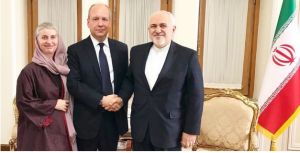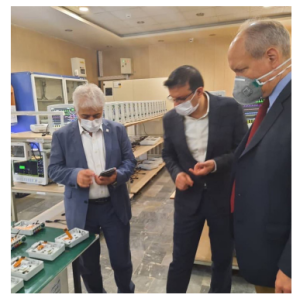By: Trends Editorial Team

Mattias Lentz took up post as the Swedish ambassador to the Islamic Republic of Iran in September 2019. He joined the Swedish foreign service in 1992, and served twice in Beijing, Jakarta and New Delhi. During his postings in Stockholm, he worked with UN Security Council matters, and in 2018 he was in charge of formulating the Swedish-China strategy. He also served in the European External Action Service, with postings at the EU-delegations in Beijing and Manila. With a degree in political science and East Asian studies, he was first trained to be a chef and worked in some high-end restaurants in Sweden. Before joining the Swedish foreign service, he also co-owned an advertising agency, working as its art director.
Thank you so much for giving Trends this exclusive interview despite your busy schedule. We are very grateful. If you were to summarize the state of affairs between Iran and Sweden, in terms of political relations as well as trade activities and cultural exchanges, how would you describe it?
We have a long history of interaction: The first Swede to be recorded as having visited Iran came to Isfahan, in 1616. We signed a Treaty of Friendship in 1929, and Embassies were established at the same time. However Swedish travelers, explorers and businesses were present here long before that. Sven Hedin, a famous explorer and traveler, who at one time was the biggest selling author in the world, wrote his first book about his visit to Iran in 1886. Our relation today is broad and deep and, I would say, built on three pillars.
There is a strong, historic, Swedish business interest in Iran as a market and business partner. There is also a strong Swedish political interest to promote security, stability and peace in the region, where Iran is a major player. We have around 120,000 Swedish citizens of Iranian descent, a group which, through family and friends in Iran, promotes strong ties, and a mutual interest in our respective cultures. Today, I think Sweden has a good reputation in Iran. We have frequent high-level exchanges between our governments. Our relationship is well established, which allows us not only to have frank and open discussions on how to best develop our relations and move forward, but also to raise issues where we disagree or have differing values.
Sweden is home to some of the most iconic global brands such as IKEA, Volvo, Ericsson, etc. and is also a role model when it comes to social equality. How did a small country (in terms of population) become an economic and social success story and one of the world’s leaders in innovation as well as social welfare?
It is true that we take pride in having a number of Swedish companies which have turned into global brands. As you mentioned, Ericsson, Volvo and Ikea are among our global brands, but also the truck and bus manufacturer Scania, companies like ABB, Alfa Laval and Tetra Pak, are present in Iran. And to these older companies (Ericsson was founded in 1876 and Scania in 1891) we can now add “modern” ones like Spotify and Skype. And how many people know that the game “Candy Crush Saga” was developed by a Swedish company?
I think one of the reasons that these companies became global is that Sweden is a small country as you say in your question. For a company like Ericsson, the Swedish market was not big enough and they had to expand outwardly. An illustration of this is that only ten years after its establishment, Ericsson sold telephone switchboards in Shanghai, catering to the Chinese market which is quite remarkable given that it took place in the 1880s. But underlying factors to why these companies succeeded had social underpinnings. In 1842 Sweden introduced compulsory schooling for 7- to 13-year-olds. This dramatically raised the overall level of education among the people and paved the way for more students, men as well as women, pursuing a higher education.
Today, nearly half of the Swedish population has a post-secondary education, and more than three percent of our annual GDP is invested in research and development, which all contribute to Sweden consistently ranking among the top nations in innovation. Sweden is also a welfare state, and the social safety net offers entrepreneurs the possibility to experiment and take risks. Sweden has a small population but is geographically large. This has caused a well-functioning infrastructure such as railways, telecommunications and broadband, to be vital for our development The need to improve infrastructure and communication has also led to innovation.
Today, much of Sweden’s innovation scene and new businesses relate to the challenges of environmental sustainability. It is inspiring to see the many innovative solutions presented by entrepreneurs. While most of Sweden’s large global brands today have active and impressive work to increase sustainability, I think our next Swedish brand to grow globally is quite likely to have environmental friendliness as a key component. But then of course some say the main reason that Sweden is a leader in innovation comes down to the cold weather and dark winters which encourage entrepreneurs and innovators to stay home and develop their ideas!.
What is the trade volume between Iran and Sweden today? What products and services are still being exchanged, if any? Do you see any major emerging trends/patterns, for example, expansion of trade beyond activities in traditional sectors such automotive and telecom?
As with most other countries, the trade volume between Sweden and Iran has gone down since the USA’s decision to leave the JCPOA in May 2018.
Swedish exports to Iran dropped by about 60 percent from 2019 to 2020. However, we saw a 10 percent increase in imports from Iran over the same period. Iran has historically been one of the most important Swedish markets outside of Europe, and a large number of Swedish companies have a long tradition in the country.

These companies maintain an interest in Iran itself as a market and business partner, as well as in Iran as a gateway to the region. Therefore, they will keep their presence here; as the potential they see for trade and economic relations with Iran is intact. A key challenge at the moment is of course to maintain normal business interactions despite current circumstances, especially in the financial sector. Sweden has recently become a shareholder in INSTEX, and with that I am hoping new avenues for Swedish companies can open up. Traditionally, as you mentioned, we have seen a large Swedish presence in the automotive and telecom sectors, but there is also considerable interest in the health sector, as well as consumer goods and packaging, and other areas
What do you see as the biggest hurdles in the way of doing business between the two countries – such as US sanctions, lack of information among traders on both sides, etc.?
The sanctions, which also include the risk of secondary US sanctions, have created an uncertainty, and sometimes a lack of understanding about which transactions and business deals can still be made. At the same time there are goods that are being exempted from the sanctions, especially humanitarian goods. Adding to this mix-up is a great reluctance among financial institutions to handle transactions connected to Iranian interests. As mentioned, those Swedish companies who have an interest in Iran, in many cases have along experience of doing business here.
Are there any business delegations visiting either side any time soon? If so, in what sector(s) and when? Are there any major cultural/artistic or sports activities between the two countries planned for 2020 and 2021?
Well, for the moment COVID-19 has put a stop to physical exchanges and visits. We do have a number of events to be scheduled, including a meeting of the Joint Commission between Iran and Sweden. The purpose of the Commission is to discuss economic cooperation, and other issues related to our trade relations. We are looking at arranging the meeting as soon as the pandemic allows.
Our cultural exchange has also been hampered by the situation, but we are looking at taking part in a Swedish film in the upcoming yearly European Film Week, which this year will be online. We are also exploring more ways to continue our cultural exchanges online. There is much to be done in the cultural field, as there is a large interest in Sweden about Iranian culture, especially in poetry, film and history. Here in Iran, we are met with an encouraging interest in Swedish culture, film, design art and last but not least children’s literature.
Could you introduce us to your everyday work as Ambassador of Sweden to Iran?
In normal times, it is a busy schedule which includes meeting with many representatives of the Iranian government, business and other sectors of society and traveling to different parts of the country. I am also overseeing the Embassy’s active work in all our sections, political, cultural activities, economic and trade promotion, as well as consular services to Swedish citizens and visa and migrations operations for Iranian, Afghan and Iraqi citizens. Since COVID-19 reached Iran, our daily work schedule has been very different.
The main reason that Sweden is a leader in innovation comes down to the cold weather and dark winters which encourage entrepreneurs and innovators to stay home and develop their ideas!
 The Embassy’s operations are restricted to avoid the spread of the virus, to protect visitors and staff and to follow regulations and instructions by the Swedish government, which includes a temporary travel ban for non-EU citizens. This is especially noticeable for our visa and migration operations, which in normal times receive a large number of visitors and applications every day. However, it is also affecting our work for trade promotion and cultural activities, and we have to think about new ways of interaction, for example to develop online-based means for cooperation. At the Embassy, we have divided staff into different groups to avoid potential transmission of the virus; many of the staff have not met in-person since February. It remains challenging and I look forward to the day we can operate as normal again. For the time being, we need to keep those precautions in place.
The Embassy’s operations are restricted to avoid the spread of the virus, to protect visitors and staff and to follow regulations and instructions by the Swedish government, which includes a temporary travel ban for non-EU citizens. This is especially noticeable for our visa and migration operations, which in normal times receive a large number of visitors and applications every day. However, it is also affecting our work for trade promotion and cultural activities, and we have to think about new ways of interaction, for example to develop online-based means for cooperation. At the Embassy, we have divided staff into different groups to avoid potential transmission of the virus; many of the staff have not met in-person since February. It remains challenging and I look forward to the day we can operate as normal again. For the time being, we need to keep those precautions in place.
How do you see the upcoming US elections impacting relations between Iran and the West? Can a major change of guard at the White House revive the JCPOA and make Iran a possible trade and investment destination for Swedish companies again?
Sweden supports the JCPOA, and continues to encourage all parties to the agreement to uphold and implement its conditions. It was with deep regret we saw the US leave it, and we encourage the US to rejoin the JCPOA.
With the elections now having been won by Joseph Biden, who has said he wants the US to rejoin the JCPOA, I think prospects certainly look better, and that we might see a possible opportunity for talks between Iran and the US and perhaps other parties to the JCPOA. With that said, we strongly encourage Iran to equally uphold and implement all parts of the agreement, and to retract steps taken, that are not in compliance with the treaty. This is also something I understand Joseph Biden says would be a condition for the US to return to the negotiating table.
We should be realistic and understand that things will take time. But we, from the Swedish side, saw in 2016 and 2017 what the JCPOA meant for the development of economic ties, with a number of Swedish business delegations, one led by our Prime Minister who came here to explore the potential of Iran as a market and business partner. I have now had meetings with representatives of Swedish companies based in Iran and sense a growing hope among them that things will turn around.
I would for that reason and also because I see the JCPOA as a way to attain stability, security and therefore development in Iran and the region, welcome a return of the full implementation of the JCPOA.
Companies maintain an interest in Iran itself as a market and business partner, as well as in Iran as a gateway to the region. Therefore, they will keep their presence here; as the potential they see for trade and economic relations with Iran is intact. A key challenge at the moment is of course to maintain normal business interactions despite current circumstances, especially in the financial sector.



